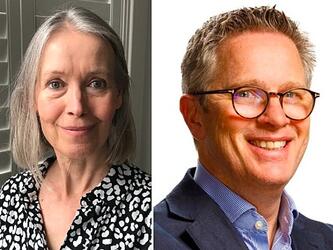NatCen CEO Michael Davis on the ‘national asset’ of understanding what people think
What are your aims in the first few months as CEO?
Definitely listening, learning and talking to the teams. I asked people internally to summarise NatCen in three words, and the most cited were ‘quality’, ‘friendly’ and ‘research … genuinely, that summarises what it’s like to be here. It’s a warm, welcoming group of people really committed to research, and the quality really matters to teams. Obviously there are frustrations, and things that we need to address, but quality, friendly and research came through powerfully. What people really valued was the culture and the commitment to high-quality research. Mine was a very quick survey, I’m not sure it would have qualified as high-quality!
The belief in the power of social research really comes through strongly, and you can see that’s why people joined the organisation. What I have said to the trustees is that in the new year we need to think about the strategic choices we need to make to really bring that to life. There’s little snippets that I’ve seen: alongside all the research that we do, we contribute in a small way to teaching and learning in social research – I think that’s got a lot of potential in it and I’m keen to explore that; we’re the only organisation that can do biomedical research; we’ve got a small international team; the work we do around deliberation.
What I’m doing is finding all these really great nuggets and then I’m going to be thinking about how it all comes together to form a strategy. We do an awful lot and perhaps we just need a bit more packaging.
You have worked across various sectors and organisations [Davis joined NatCen from Kantar]. What do you bring from your private sector experience?
I’ve done not-for-profit, I’ve done non-departmental public bodies, affectionately known as quangos, I’ve done private sector under plc and under private equity and this is the first time I’ve worked for a charity. They’re far more the same, when they’re really good, regardless of organisational form, they’ve got clarity of purpose, good leadership, strategy which forces us to make choices, good metrics, and they’ve got a sense of culture of encouraging belonging and challenge. Your organisational form doesn’t mean that you do or don’t get those outcomes.
What I think is different, and what for me, personally, is exciting about NatCen is because it is a charity, any operating surpluses that we create can only be reinvested in our team, our capabilities and our core purpose.
How do you think your aims align with the current organisational strategy?
We have a very strong sense of purpose. We do need a strategy refresh in the new year – we’re doing lots of really interesting things but we probably need to bring them together in a way that encourages us to make choices.
When I think about what the challenges are externally, from a social research perspective, it’s about looking at how you make data more inclusive, making sure that marginalised seldom-heard groups are properly heard and understood, recognising that clients’ budgets are always under pressure and that at the same time they’re always going to ask for more granular data. There’s also the general public decline in engagement with survey work.
one of the national assets that you want is the ability to really understand what people think, what they worry about, what their hopes are, and to do so in such a way that is really methodologically rigorous.
For me, however the strategy of NatCen goes forward, what will be absolutely critical is that we are at the heart of social survey work in the UK. Our scale of work puts us there. The history of far more capable people than me, in terms of innovation and methodology, puts us there.
I would hope that our strategy has us working in partnership with clients and other key stakeholders in really trying to solve the conundrum of the falling response rate, the hard-to-reach groups, and making sure that we’ve got a highly capable and engaged interviewer community.
None of the data collection challenges are new, but what is really important to the identity of what NatCen is and what it’s striving to be, as an organisation, is that we should be at the heart of solving those challenges. There’s a couple of colleagues here working on Survey Futures, and we’re one stakeholder here amongst many, but I'm sure that whatever the outcomes, it will be really important that NatCen is at the heart of that.
Why do you particularly feel that is NatCen’s role?
It literally comes back to our objectives as a charity. My predecessor, Guy [Goodwin], left me a drawer behind and I dug out the original trust deed from when we were formed in 1969: it’s ‘the promotion of research in the social, economic and political sciences, the dissemination of results thereof and educational purposes incidental thereto', which is just brilliant.
Coming from the consumer landscape, where you’ve got clients looking for things constantly faster, I think what NatCen wants to be is the organisation that is always working really hard to make sure that you are getting to the voices that don’t get heard. That feels really important in any society. Again, NatCen is not the only one, but I definitely want us to be a key part of that.
There is a series of national assets, and one of the national assets that you want is the ability to really understand what people think, what they worry about, what their hopes are, and to do so in such a way that is really methodologically rigorous. A lot of the work we do goes into national statistics and public records so it needs to be done to a really high calibre.
It feels almost institutional to the fabric of what NatCen is – that we want to be at the heart of really high-quality data collection, which will always involve an aspect of a person talking to another person to encourage them to get involved in an interview in some shape or form.
Can you describe what your experience has been like of coming in to this position so soon after the formation of a new government?
Very practically, a lot of what we do is contributing to national or public body statistics, so that work has just carried on. In the policy teams, obviously they are looking particularly at the five missions of the new Labour administration. When you look across their five missions, I feel quite confident that we’ve got a good solid offer in place in terms of the good solid evidence that informs the policy interventions, and then as you start going through those interventions, the skills and the capabilities to evaluate their effectiveness.
It’s early days obviously, and I don’t think anyone’s under any illusions – the public spending environment is going to be very tight. But, I think in terms of the policy opportunities, they’re very strong.
Step out of the way, trust the people that you’ve employed, that they know how best to do it. Your role is to encourage people along, not to be standing in the way.
What is the key broad challenge for social research that particularly concerns you?
It’s almost like imagining there’s a multiplier effect. When you think about social policy, where it differs from consumer research – which is trying to reach mass audiences – is that you’re consciously trying to reach the audiences that other people don’t try that hard to get to. At the same time, clients want much more granularity in terms of the data. You’d like to be able to do it more frequently, you’d like to get much better understanding of the social demographics, and then you’ve got a decline in public engagement. It’s the compound effect of those three things that creates the challenge.
I don’t have any magical answers, but as I said, I am sure that NatCen has to be at the heart of the solution. I do think there’s perhaps something around scale and how we share resources, because there is an interviewer community that we all collectively need to train, develop and try to raise the worth and professionalism of, and really value those individuals as people - they’re doing a really important but hard task.
What are your priorities as a leader of people in the organisation?
As a leader, the first step is always absolute clarity of purpose and I come into an organisation that has a really strong sense of purpose, so big tick – there’s literally nothing for me to do there. It’s important to say ‘I really believe in this purpose’, because I genuinely do and because you want that consistency of organisational direction.
You need absolute clarity of purpose, clear strategy and plans so that people know what they’re doing, know what success looks like, and then create an enabling culture where people can just get on with it. As a leader, you need to have the humility to not get in the way.
A long time ago, I read The Servant as a Leader by Robert Greenleaf. I read it so many years ago I’m sure I’ve mentally reinvented it, but the concept of servant leadership – that your role is to create the conditions in which people can be really successful – is really important. The team here is so talented. I have a degree and in most meetings, I’m comfortably outnumbered by people who’ve got masters and PhDs. My role is to create the conditions in which that capability can succeed and the organisation really can make a positive impact.
It’s not a soft form of leadership, it’s quite tough. What you’re doing is saying: ‘I’m going to create as much clarity about the purpose and the outcome for this organisation as I can, and I’m going to give you the best tools that I can in terms of the metrics and measures we use to collectively hold ourselves accountable for success’, but in terms of the ‘how’? Step out of the way, trust the people that you’ve employed, that they know how best to do it. Your role is to encourage people along, not to be standing in the way – but equally, it’s not to be confused with not standing at the front. There’s definitely times when the CEO needs to stand at the front and support your team, but focus on creating the conditions in which they can succeed.
What is your view on the use of generative AI in the research process?
With all the caveats that I’m not the world’s greatest researcher, a positive and a note of caution. The positive is generative AI offers tools that enable you to be more productive in your role and all credit to Microsoft for having picked the wonderful name Copilot; it’s there to help you do your job quicker, help solve the blank sheet of paper, but it’s not taking away your responsibility.
In the near term, it helps people do their tasks more effectively. The bit that we’ve got to keep working through is the provenance of the data and the supply line. In any research exercise, I should be able to hand over to you what I captured, the methodology I deployed, a clear set of instructions, and I should be able to pass that over to you and then you repeat it, and then you’ve got a really good provenance. If you ask me how I got my results and I say I put it through an AI tool, that doesn’t feel like I’ve got provenance of the data any more.
You’re always going to have to show provenance of your data, again, particularly when you’re thinking about marginalised groups. The risk is where AI takes its data from – for want of a better expression – norms of those people who participate and then it keeps modelling off the back of those, then the marginalised groups are even less heard.
If all the participants in your studies and all the data that you’ve got historically fall around some very central groups of people, whether by ethnicity, gender, age, etc, and the models keep on learning from let’s say the 80%, then the 20% are further back, so the people that never participate are even further back from being included in the thinking.
This interview has been edited for clarity.

We hope you enjoyed this article.
Research Live is published by MRS.
The Market Research Society (MRS) exists to promote and protect the research sector, showcasing how research delivers impact for businesses and government.
Members of MRS enjoy many benefits including tailoured policy guidance, discounts on training and conferences, and access to member-only content.
For example, there's an archive of winning case studies from over a decade of MRS Awards.
Find out more about the benefits of joining MRS here.














0 Comments